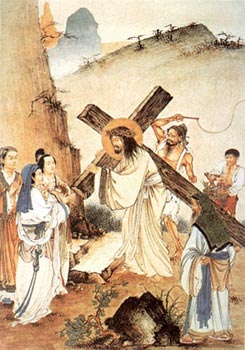There have been several notable deaths over the past few days – film director Anthony Minghella, actor Paul Scofield, Focolare founder Chiara Lubich – (here is the Pope’s message read at her funeral – and here is an account of Cardinal Bertone’s homily at her funeral).
Jon Hassler was unjustly pushed into the “regional novelist” box for much, if not most of his career. I can never figure out what makes one a “regional novelist” as opposed to simply a “novelist.” True, Hassler set most of his books in Minnesota, but his themes and characters had broad appeal. Catholicism factors into much of his work – some may have been introduced to Hassler’s novels by a made-for-television adaptation of his novel A Green Journey, that starred Angela Landsbury as Hassler’s most well known and perhaps even beloved continuing character, Agatha McGee, a retired Catholic school teacher who was the very definition of a strong-willed, definitive personality, had deep disagreements with much of what was going on in the post-Vatican II Church, but also had a heart particularly welcome of the forlorn and the abandoned.
I was honored to work a bit with Mr. Hassler a few years ago, as Loyola Press prepared to bring North of Hope back into print as part of the Loyola Classics series. (I ended up writing the introduction.) It’s an absorbing, big book that may be, on its most obvious level, about a priest, but is more deeply about decisions, regret, redemption and living life at peace in the midst of that reality – life is not what we thought it would be when we were young. But perhaps, miraculously, it is better, even through the pain, than anything our limited vision could have imagined for ourselves.
From my introduction to North of Hope:
…into this reality — sometimes a very cold and ugly reality, because that is the way life can be — warmth creeps, slowly. All of the characters in North of Hope face crises, small and great. The real drama, slower, absorbing, and deep, lies in the process of these same characters emerging from the crises that have shaken them, and accepting that the past cannot be changed. You are where you are, and right now, another choice presents itself. You can drown in regret and self-loathing or you can reconnect with life, with hope — with God.
Terry Teachout, far more eloquent than I:
One of the things that makes these characters so distinctive is that many (though not all) of them are churchgoers. Not coincidentally, Hassler is a Catholic novelist, and certain of his books are very decidedly the work of a Catholic novelist. Yet their temperate emotional climate has little in common with the claustrophobic creations of, say, Graham Greene or François Mauriac. In Hassler’s novels, no one, not even the priests, is obsessed with the problem of faith in the modern world, nor do his teachers, grocery-store owners, and family doctors take much of an interest in what Browning called “the dangerous edge of things.” They are simply trying to get along in a complicated world, and though they view that world through the prism of belief, most have learned that few answers are quite so easy as they look…
Rest in peace, Jon Hassler. And thank you for telling your stories.

